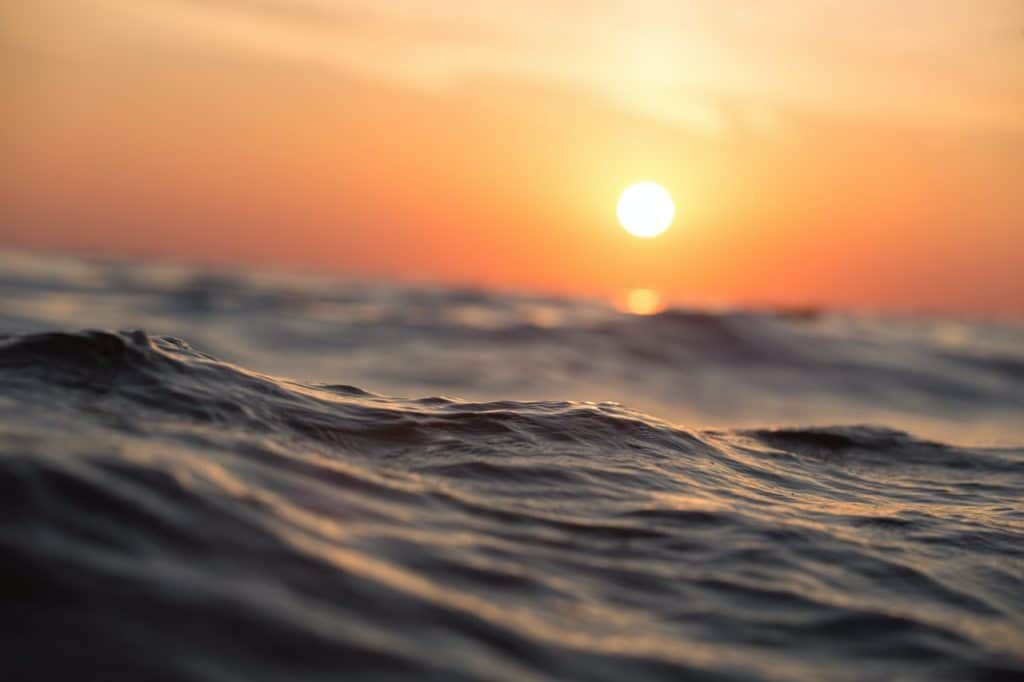Youth advocate: News reports on climate change often neglect an essential component—the ocean
By Mark Haver | September 15, 2021
 Image courtesy of Sebastian Voortman/Pexels
Image courtesy of Sebastian Voortman/Pexels
The Sunday before I started my first year of college, my mom and I visited my hometown’s downtown neighborhood, Old Ellicott City in Maryland. When it started to rain, we left and returned to our own neighborhood. Within two hours, water was pooling in our basement, and family and friends across the country were calling us to make sure we were still alive.
They told us to turn on the television. There we watched cars float down Main Street in Old Ellicott City, some with people still inside. Even people who had taken shelter indoors were panicking, afraid that the buildings wouldn’t be high enough to escape the rising water. Where we had been two hours earlier was suddenly submerged in 10 feet of floodwater. In a matter of hours, flash floods took two lives and washed away stores that had been there for decades.
This is outside right now. pic.twitter.com/IBeikcijKo
— maxgrobinson.bsky.social (@DieRobinsonDie) May 27, 2018
People said the flood was the kind that only came once in 1,000 years. I will never forget how much hope my community had as they rallied to restore downtown. But two years later, after millions of dollars invested and a lot of hard work by small business owners to reopen, another “thousand-year flood” ransacked the city and smothered any hope of getting things back to the way they were.
My generation is no stranger to stories about seasonal rains that became floods, dry spells that became droughts, or an occasional hurricane that became an annual evacuation. Our climate is changing, and these changes aren’t expected to stop anytime soon.
While the climate conversation often makes headlines, ocean news is neglected. Even though the ocean is our best tool for climate regulation and mitigation, most people don’t know it yet. As climate change makes some regions drier or wetter than in the past, understanding how a degraded ocean impacts coastal communities is more important than ever. More than a third of the world’s population lives within 100 kilometers of a coastline, so climate impacts on these communities may be more apparent than region-specific floods or droughts.
When young people who are concerned about the ocean reflect on its current health, we see formerly vibrant, biodiverse coral reefs bleached white by rising ocean temperatures. We feel slimy plastic bags brushing past our bodies when we go to the local beach. We hear once-distant waves crash closer and closer to our homes as sea level rises. While we may not see the ocean in the news, we sense the changes. When we think about the commitments being made for a “green transition,” we also need to think blue.
Building the youth climate movement. In the face of an ecological emergency, my experiences, and those of many of my peers and friends around the world, have motivated me to speak up for my generation’s rights to enjoy the same opportunities that previous generations have experienced. I will not stand to see communities like mine washed away for lack of political will to stabilize the climate.
In 2019, events like the Global Climate Strikes and Fridays for Future protests showcased predominantly young voices calling for policymakers to step up to rescue a dying Earth. This activism led to revolutionary policy frameworks, like the Green New Deal. Policy like this has completely reshaped the global climate conversation to include the demands of young people who want to build a more equitable future.
International organizations and sovereign governments have now translated the Green New Deal into frameworks and policies of their own. It’s clear that environmental policies demanded by young activists have energized the discussion about global decarbonization and the social impacts of climate change.
However, the Green New Deal only mentioned the ocean once.
Bringing blue into the Green New Deal. As governments coalesce around plans to literally save the world, humanity must recognize that there is no future without a healthy ocean. Not only does the ocean support life on Earth, but the ocean economy supports livelihoods. The annual economic value of the ecosystem services, jobs, and cultural services provided by the ocean is estimated to be between $3 trillion and $6 trillion. Fisheries and aquaculture alone contribute $100 billion per year and more than 250 million jobs.
As youth, my peers and I need to advocate for progress in achieving the United Nations Sustainable Development Goals. These goals identify 17 global challenges for countries to solve together to promote peace and prosperity. Two of the UN goals address climate change and ocean health, respectively. Young people, the greatest stakeholders in the future health of the environment, need to hold the global community accountable to achieving these goals and other climate commitments, like the Paris Agreement.
And climate change is not the only threat to our ocean.
The ocean is overfished, rife with plastic, and exploited for non-renewable resources like minerals and fossil fuels. This perpetuates a cycle of generational injustice, leaving people my age to inherit an increasingly degraded environment with less and less time to restore it. The most vulnerable global communities, who contribute the least to global emissions, will feel the effects of this degradation the most severely.
My young friends and I recognize the crucial role the ocean plays in regulating climate and providing food, oxygen, and ecosystem services essential to our well-being. By ensuring that we are prioritizing environmental health as we recover from the pandemic, and by building a sustainable blue economy, future generations may appreciate the greater equity that comes from sustainably balancing ocean, human, climate, and economic health. The only future is one that ensures the sustainable use of ocean resources for economic growth while also preserving the health of ocean ecosystems.
Creating the Global Blue New Deal. As chair of the Sustainable Ocean Alliance’s Youth Policy Advisory Council, which brings together 15 early-career ocean professionals under the age of 35 from nine global regions, I have immense appreciation for the stories of my fellow council members who are working to combat environmental changes that threaten their quality of life. Our homelands include island nations and countries where there is little water at all, and our experiences and passion for building a better future have unified us. Together, we are committed to address the far-reaching ecological and social impacts of an imbalance between ocean, human, climate, and economic health. We understand that we must use policy to rectify that imbalance and promote a better future.
It soon became clear to our Council that a set of clearly defined priorities must be part of a global ocean policy platform. After the Sustainable Ocean Alliance distributed more than 100 surveys in 38 countries and five languages, to better understand the ocean policy priorities of young people, my team and I synthesized these survey responses into a youth-led, crowdsourced ocean policy framework that we call the Global Blue New Deal.
The United Nations has declared 2021-2030 as a Decade of Ocean Science for Sustainable Development to gather global ocean stakeholders behind a common framework to deliver “the ocean we need for the future we want.” I hope to lead the Sustainable Ocean Alliance’s Youth Policy Advisory Council to do the same. We, as youth, have the opportunity to contribute to the success of the Ocean Decade; that’s why we must call on the international community to recognize our Global Blue New Deal as a collection of ocean crisis priorities with respective solutions.
Our future must be built with resilience in mind. While Ellicott City may serve as a precautionary tale, the downtown still bustles with teenagers eating ice cream and new shops opening. Young people must not give up hope. Let’s use this opportunity to build a healthy ocean and a just future for all.
Together, we make the world safer.
The Bulletin elevates expert voices above the noise. But as an independent nonprofit organization, our operations depend on the support of readers like you. Help us continue to deliver quality journalism that holds leaders accountable. Your support of our work at any level is important. In return, we promise our coverage will be understandable, influential, vigilant, solution-oriented, and fair-minded. Together we can make a difference.
Keywords: Global Blue New Deal, Sustainable Ocean Alliance, flooding, ocean
Topics: Climate Change, Voices of Tomorrow














